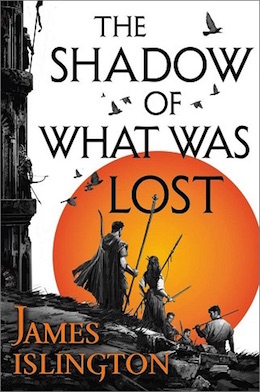Twenty years after the Unseen War, powerful mages known as Augurs are no longer so powerful. They have been stripped of their standing in society and their powers have failed them. In their place are mages who possess the Gift, but their rise is only a result of the strict rules called the Four Tenets—not unlike Asimov’s Three Laws of Robotics—under which they must operate. Though these Gifted individuals are able to use their form of magic—the Essence—they are not looked upon with great favor by society at large. Unfortunately, the world is still under threat of attack from those on the other side of the Boundary, a dark army sealed nearly two thousand years prior to the novel waiting to escape and reap their revenge. As the novel begins, characters are concerned that the Boundary is not going to hold for very much longer. Against this backdrop, the lives of young Davian, Wirr, Asha, Dezia, and Caeden unfold under the auspices of the school for the Gifted where many of them meet. Although using the term school might be generous since the ‘students’ are afforded too much freedom as their Administrators watch over them.
Clearly, Islington is playing with familiar tropes in his debut novel, The Shadow of What Was Lost. Originally published in 2014 in Australia, Islington’s debut—the first volume of a the Licanius Trilogy—arrives in the US today.
Islington devotes a great deal of the novel to providing background information about his characters and the depth of history of his world. The connections between the characters and that deep history is revealed over the novel’s nearly 700 pages giving a great deal of detail to them. Each of the primary characters possesses a mystery or secret about them, they aren’t exactly what they seem. Adding to the “secret mystery” is that most of these primary characters have very thin memories of themselves, only going back to just before the novel began. The most interesting of these character’s secrets felt rather obvious and was choreographed about two thirds through the novel, but Islington’s best passages seemed to be reserved for this revelation at the conclusion of the novel.
While some of the characters and mythology in the novel felt as if they had weighty, deep roots, other elements were not quite as developed. The weakening “Boundary” was continually referenced, but through most of the novel, the consequences and threat lacked urgency. There was no “why” to the threat, just that it existed, which made the potential breaking of the “Boundary” feel as if it would be inconsequential. Another looming threat is a character named Aarkein Davaed, a man who committed both heroic and heinous acts in the past and is rumored to be returning to continue his trail of darkness. You can almost see the letters of another famous character in that name, known for both heroic and heinous deeds (as well as a dark helmet and very audible breathing mechanism), whose heinousness far overshadows his heroism. These elements of things to be expected or known without why they are to be known contributed to the novel feeling more like a middle-book rather than a trilogy’s launch title. In other words, for as much world-building and character-building as the novel has, it feels as if a prologue or first book’s worth of tension and threat-building is missing.
Having read many epic fantasy novels and series, “hints of things to come” in later volumes is to be expected and probably part of why longer series are popular. However, the balance between those hints of something substantive being revealed in later volumes and revealing information in the immediacy of the current volume was uneven. The character’s journeys also suffered from a sense hollowness. They were told to go places, but the destination wasn’t always clear and the reason for their journey wasn’t always clear. It felt like the story knew it needed to arrive at certain points and was determined to get there despite itself, in the same way a parent says “Because I said so,” with no other reason.
Unfortunately, too much of the nearly 700 pages of The Shadow of What Was Lost was world-building and showing what the characters were rather than getting to know who the characters were. While the characters had a great deal of historical depth, their emotive depth was not on an equal footing. With so many Named Things and Character Classifications, an appendix or character list would have been helpful, which would have made the novel something into which I could more fully invest myself.
When a novel is boldly compared by readers to The Wheel of Time, the expectations are clearly high. Those high expectations are also unfair, too. That may be the case for The Shadow of What Was Lost. Although I was able to take that comparison with a large grain of salt, Islington did manage to impress me with the historical scope of his world. He has a knack of sorts for world-building and injecting smaller stretches of narrative with tension and immersion. In the end, The Shadow of What Was Lost offers a great deal of promise, but is ultimately very uneven which is typical of a debut novel. There were sparks of enthralling storytelling sprinkled throughout the novel, but if the whole of the novel could match the immersive, narrative pull of the conclusion, the novel would have been much stronger overall.
The Shadow of What Was Lost is available from Orbit.
Rob Bedford lives in NJ with his wife and dog. He reviews books and moderates forums at SFFWorld, has a blog about stuff, and wrote for the sadly closed SF Signal as well as here at Tor.com. If you want to read random thoughts about books, TV, his dog, and beer you can follow him on Twitter: @RobHBedford.










